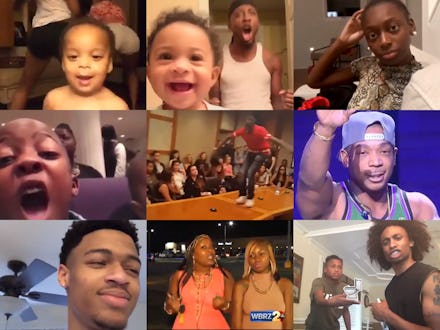Black Twitter is responsible for the most important internet content of the decade

Some of the decade’s funniest and most viral moments have come from Black creators. There have been sketches, dances, home videos, and countless front seat monologues. There’s the guy playing the piano while his friend Nae Naes. The Supa Hot Fire freestyle. Bodega dancing. And Disney characters dancing to DJ Telly Tellz’s “Fuck It Up Challenge.” The archival tags #TwitterMomentsOfTheDecade and #TwitterMomentOfTheDecade were created to celebrate ten years of creativity. And, of course, to get a good laugh.
“I'm like, ‘Oh, it's the end of the decade, I literally just had viral tweets on my page of the end of decade vines that we like,” the tag’s creator, Juwan Evans, explains in a phone call with Mic. “Then I made a dance video, showing all the dances that we did throughout the decade. And I'm like, ‘Oh, people love the end of the decade material. So let me jump on that and make something else.’”
His Moments page has hundreds of videos in a comprehensive thread. There’s the sermon delivered by the little girl in the back seat of a van, which went on to become the intro to a Kanye West song:
The Retro Spectro sketch that ultimately led to a dozen spin-off gifs:
The countless Bird Box videos:
“I just really dug deep into Twitter's history and background and looked for what's funny and what everyone finds funny and not just a random thread of videos,” Evans says of creating the threads.
The Moments page ended up getting temporarily suspended because of the extensive usage of the hashtag. “At that time, I was the only one using the hashtag, so Twitter thought I was spamming.”
But as the hashtag blew up, Evans wasn’t really receiving credit or being linked back to as it took off. And that’s part of a larger trend when it comes to the work that Black creators put online.
“I have over 150 some videos tweeted on that account, and I will say, there's probably like 10 to 15 people in that thread actually got credit, like one hundred percent from blogs or had anyone pop culture sites actually contact them about their video,” Evans says. “Not a lot of Black Twitter people who make viral videos get noticed, we just go viral. But like you see, like, other people like, Caucasians people, they will go viral and their videos will be on Ellen.”
The issue of the exploitation of Black art and content is nothing new; it’s an American tradition. Black people create, shape, and cultivate music, movies, dance, television, fine art, and fashion. But in online spaces, there’s an obvious paper trail. An easy example is Megan Thee Stallion’s phrase (and now song and trademarked property) “Hot Girl Summer.” It went from Megan’s social media pages to the social media accounts of Black women all over… to the corporate Twitter accounts of brands like Wendy’s.
Part of Evans’ mission, beyond just liking the entertainment value his threads and trends provide, is to give credit back to the creators he shares from. “I try to give credit back to them,” he says. “I'm posting videos and I'm trying to find all the funniest things to give them some type of recognition, because, years went by and they probably are like, ‘Oh, I had a viral video, but I couldn't do nothing with it.’”
In the absence of an online ecosystem that fairly credits and compensates creators, profiting off of virality is a mixture of persistence and luck. It’s how Lil Nas X pushed “Old Town Road” on Tik Tok, which ultimately led to his five Grammy nominations. Evans, who is also a musician who works under the name King Trilla X, is hoping to be able to replicate that model with his own music. “I took a page from Lil Nas X’s book. I saw he could do it, so I was like ‘let me see if I can do it.’”
But there are no guarantees — and that’s evident in the hundreds of videos that have become so quotable and recognizable that they’ve become cultural objects, but whose creators remain largely unknown. As the decade comes to a close, the internet has undeniably been made better by the contributions of its Black users and hopefully, in the next decade, there will be a better collective effort to acknowledge that. Until then, threads and hashtags will provide an archive for our favorite content.
“Everyone wants to get some type of recognition for their work,” Evans says. “I know I do. I've been doing it for years.”